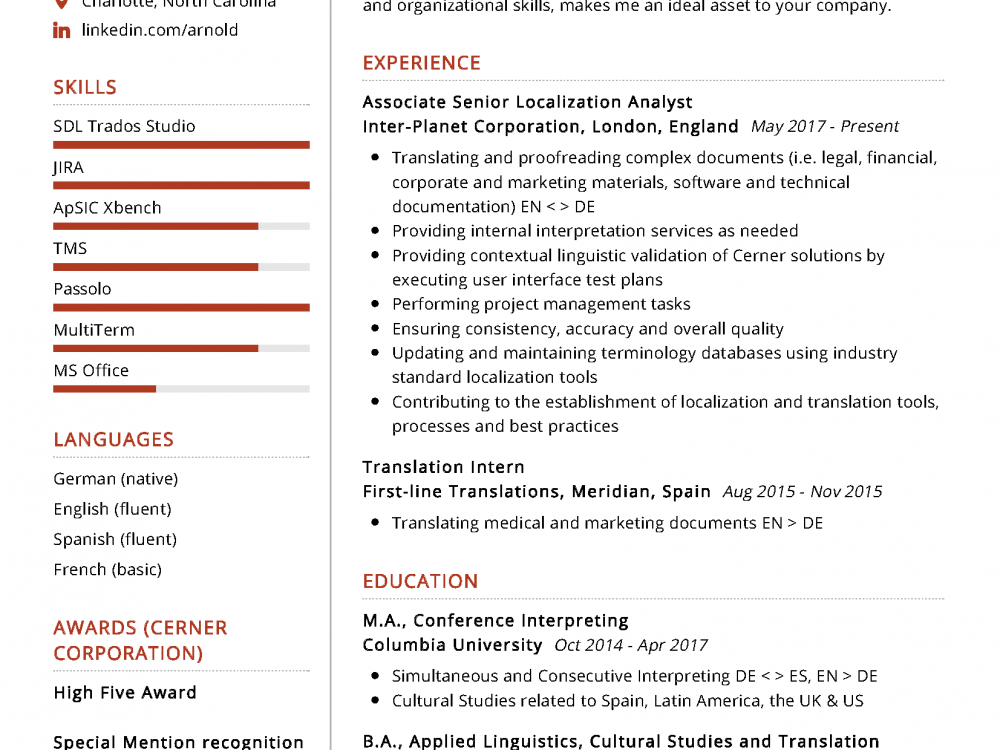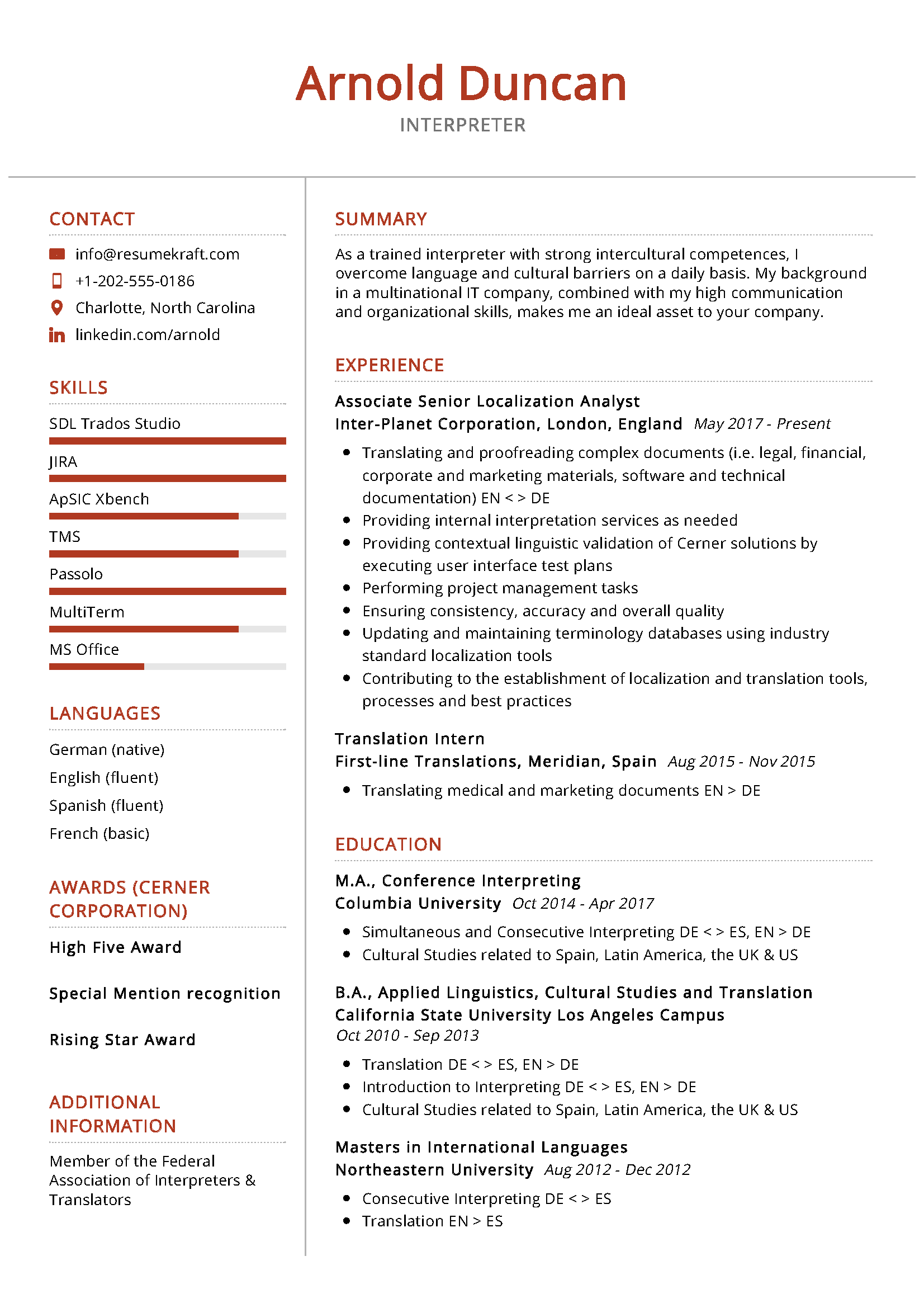Are you a professional Interpreter and looking for an exciting career? We have good news for you! use our professional Interpreter resume example. You don’t have to start writing from scratch. Just click “Edit Resume” and modify it with your details. Update the template fonts and colors have the best chance of landing your dream job. Find more resume samples.
Interpreter Resume Sample
Arnold Duncan
Interpreter
Summary
As a trained interpreter with strong intercultural competences, I overcome language and cultural barriers on a daily basis. My background in a multinational IT company, combined with my high communication and organizational skills, makes me an ideal asset to your company.
Skills
Experience
Associate Senior Localization Analyst
Inter-Planet Corporation, London, England
- Translating and proofreading complex documents (i.e. legal, financial, corporate and marketing materials, software, and technical documentation) EN < > DE
- Providing internal interpretation services as needed
- Providing contextual linguistic validation of Cerner solutions by executing user interface test plans
- Performing project management tasks
- Ensuring consistency, accuracy, and overall quality
- Updating and maintaining terminology databases using industry-standard localization tools
- Contributing to the establishment of localization and translation tools, processes and best practices
Translation Intern
First-line Translations, Meridian, Spain
- Translating medical and marketing documents EN > DE
Education
M.A., Conference Interpreting
Columbia University
- Simultaneous and Consecutive Interpreting DE < > ES, EN > DE
- Cultural Studies related to Spain, Latin America, the UK & US
B.A., Applied Linguistics, Cultural Studies and Translation
California State University Los Angeles Campus
- Translation DE < > ES, EN > DE
- Introduction to Interpreting DE < > ES, EN > DE
- Cultural Studies related to Spain, Latin America, the UK & US
Masters in International Languages
Northeastern University
- Consecutive Interpreting DE < > ES
- Translation EN > ES
Languages
Awards
- High Five Award
- Special Mention recognition
- Rising Star Award
Career Expert Tips:
- Always make sure you choose the perfect resume format to suit your professional experience.
- Ensure that you know how to write a resume in a way that highlights your competencies.
- Check the expert curated popular good CV and resume examples
Interpreter Resume Resume with Writing Guide
If you are looking for a new job as an interpreter, but you aren’t sure where to start, then this post is right for you! We’ve gathered some of the most important things about Interpreter Resume resume writing and put them all in one place for your convenience.
Interpreter Resume Resume Writing Guide:
- Your resume should be tailored to the job you are applying for.
- Include all of your relevant educational and experience qualifications.
- Put yourself in the shoes of the employer or recruiter – write from their point of view as a way to make sure you are addressing your skills properly.
- Make sure that you have someone proofread your resume for errors before submitting it to potential employers.
- Use a professional font that is easy to read.
- Be sure to include your full name, mailing address, email address and phone number on your resume.
- Don’t have gaps in your employment timeline – potential employers will ask questions if there are too many “holes” in your work history.
- Make sure that you have no misspellings and that everything is formatted correctly according to industry standards.
- Keep it short – a resume should never exceed two pages in length!
- Don’t get too personal – keep your resume professional.
- Don’t include references on your resume unless it is specifically requested.
- Clean up your resume! Do not use abbreviations and do not overuse the exclamation point!
- Apply for jobs in your area – if you have to move for a job, then make sure that there is a way to get there.
- An interpreter’s resume should always list certifications (and the dates) of any training you have received in order to keep your skills fresh and updated.
Interpreter Job Responsibilities:
- An interpreter should have a solid understanding of the job’s purpose.
- An interpreter must work with the other interpreters and the facilitator to ensure that everyone is on the same page during a session.
- An interpreter must do their best to make sure that communication is occurring as effectively as possible at all times.
- An interpreter should make use of proper terminology and be familiar with the correct language interpretation industry standards for confirmation purposes.
- An interpreter should identify the main purpose of a meeting, presentation or lecture and keep that purpose in mind while interpreting.
- An interpreter should be familiar with the rules and regulations surrounding their workplace.
- An interpreter should have all of their security clearance paperwork reviewed by their employer prior to starting work.
- An interpreter must ensure that all equipment and staff are completely up to date with respect to their agreement of all policies and procedures involved in the company they will be representing.
- An interpreter should have a regular schedule, and should always be available to work when needed.
- If the interpreters are not present on the day of an event, then they must be able to show a supervisor a copy of the itinerary and speak with them in advance about any questions or concerns they might have about the event.
Top 10 Interpreter Skills:
- Interpreters must be able to keep a meeting on schedule.
- Interpreters must be able to work well with other people in a team setting.
- Interpreters must be able to handle technical terms and other complex terminology without difficulty, even when they are unfamiliar with the subject matter at hand.
- Interpreters must have excellent note-taking skills for jotting down information or ideas that come up during a meeting or presentation.
- Interpreters must be able to project their voices so that they can be heard clearly by everyone in the meeting.
- Interpreters must be skilled at cross-cultural communication – often, language barriers can make it difficult for people to communicate their ideas effectively, but if the interpreter can help them bridge this gap, then all parties involved will benefit.
- Interpreters must have a strong vocabulary and be able to think quickly on their feet.
- Interpreters must be able to have a clear understanding of the organization they are representing.
- Interpreters must be able to read between the lines and understand what others might mean when they speak, even if there is a language barrier.
- Interpreters must understand how their message will be received by each party involved in any meeting or presentation – no matter what their differences are.
Interpreter Resume Objective:
A resume objective is a sentence or two statements that is used as a starting point for the resume. The objective should be written in the past tense, and it should always list specific skills that you want to highlight. This will help the reader to easily find your resume and know what you are doing on paper.
- An interpreter job objective is something that can be seen immediately, and it is usually in the first or last paragraph of your resume.
- An interpreter objective will focus the reader directly on your skills that are relevant to the job you are applying for.
- The interpreter’s objective should be easy to read and understand.
- Generally speaking, the objective should highlight one or two of the key skills that you want to feature on your resume.
- The interpreter objective should include skills that are directly related to the job you are applying for, and that you can show in your resume.
- The interpreter job objective should be used in conjunction with the resume skills section of your resume to avoid confusion.
- The interpreter objective will also help you to determine what kind of job you are looking for by pointing out all of your relevant qualifications and skills in a short, simple statement.
Top 5 Mistakes That Can Get You Hired:
- Using incorrect vocabulary (or not including it at all) – could cause problems for the interpreter if they are interpreting languages that they do not have proficiency in.
- Being late to work or showing up unprepared – interpreters must be able to put their best work forward each and every day.
- Not clearing any security issues with your employer before starting a job – if an interpreter is unable to get in touch with their employer, then they might miss an important part of a meeting or presentation.
- Not having a regular work schedule with your employer – could cause problems for the interpreter if they are unable to get in contact with their employer, which could mean missed work.
- Not being familiar with the particular client for whom you will be working – could cause problems if there is a language barrier that prevents the interpreter from understanding exactly what is being said during a meeting or presentation.
How to write an Interpreter Cover Letter:
- The first paragraph of a cover letter should include your name, contact information and best way to contact you.
- The second paragraph of the cover letter should give an overview of your skills as an interpreter and what your specialties are.
- The third paragraph should focus on speaking knowledgeably about the type of meeting or event you would be interested in working with your employer.
- The fourth paragraph should focus on the type of schedule that you would like to work with your employer and any availability issues that would affect your ability to work with them.
- The fifth paragraph should focus on why you feel you are right for the job.
- The sixth paragraph should briefly elaborate on anything in the section above that may be confusing or unclear with respect to a meeting or event (this is also where you could elaborate on any previous experience you have had).
- The seventh paragraph should explain how long you have been an interpreter and any relevant experience with the company or events you have interpreted for in the past.
- The eighth paragraph should give a little more detail about the type of event that you would like to help facilitate, such as whether it is a presentation or meeting for business purposes, a travel-related event, or an academic conference or symposium.
- The ninth paragraph should be your contact information if any questions arise during your employment for something that you do not know about.
Key Takeaways:
- An interpreter should have extensive knowledge of the business and culture in which they are working.
- Interpreters must be flexible with their schedule because it is not uncommon for them to change locations several times a day.
- Interpreters must be able to work under pressure, because sometimes there is a time limit attached to what they are doing (such as an important meeting or presentation), and they cannot fail to complete their duty on time.
- Interpreters have to focus on providing the most accurate results for their employer at all times.
- Interpreters may have some knowledge of several languages, but they should be able to think quickly and translate whatever they are speaking even if it is a different language from their own, as long as they are aware of the meaning behind what is being said.
- Interpreters must know how to put themselves in the shoes of their client and show empathy towards them if possible.


